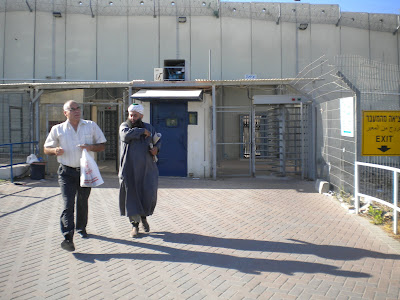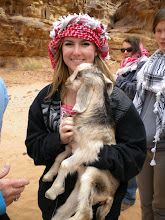
The entrance to the security labyrinth against the wall:

We arrived at the separation wall, and Tata Huda and I got out of the car to go through security while Jiries drove through. After he drove away, we paused for a second to let a group of men go ahead of us, and glancing at the long incline ahead Tata Huda turned to me, sighed, and said “Yalla” (let’s go).

I asked her if she needed help, but she said no, so I walked a couple feet ahead of Tata so I could take lots of pictures. Generally going through checkpoints, no matter who I am in the car with, I refrain from taking pictures because it makes everyone else uncomfortable since they don’t want to upset the Israeli military. There are always soldiers in the watchtowers, looking at everything you do, and I know for a fact they don’t like cameras. I don’t have any interest in testing them, but there was no way I was going to miss an opportunity to document the tedious and degrading procedure that Tata Huda was forced to go through. For me, it’s no big deal; since I am young, walking through the security station is effortless, and all I have to do is flash my American passport and I am on my way through any turnstile or metal detector. For Tata Huda, on the other hand, it’s not easy since she is elderly, sick, and Palestinian.



At the end of the outside ramp was an entrance to a small station that opened up on the other side of the separation wall. We went through a heavy turnstile, a metal detector, and then crossed the parking lot under the blazing sun just to end up at the beginning of another ramp. Tata was already slowing down, and people were beginning to pass us. One man was clearly a Muslim; he wore a long robe-like outfit with a keffiya on his head, and I thought of one of the previous times I went through the security maze and they held up a young boy in front of me because “he looked really Arab”, as his friend explained to me. I wondered if they would hold this man up, and how long we would have to wait if they did.



The view from the Jerusalem side of the wall. The more I become attached to the place and people where I am living, the more horrifying this wall is:




Down, down the ramp we went until we reached the actual security compound. We entered and upon turning the corner we were met by a line (not long) of people waiting to go through another turnstile. We were in line for about 2 minutes before Tata Huda decided to cut to the front. I actually thought she was kidding when she suggested it, but when she started making moves I realized she was really having a hard time standing for so long. Thankfully the people around us understood and they let us move to the front without a problem.






Tata Huda was in front of me, and people rotated through the turnstile until her turn came up. As she moved forward the spinning bars suddenly locked up; enough people had gone through, we would have to wait a couple minutes. Tata sighed, and then made a comment which I couldn’t understand but made everyone around us laugh. Sometimes the people here totally amaze me with their ability to laugh in the face of the most absurd and dehumanizing situations; for example, when the Sa’adeh family was visiting last week to talk about flights to America for the TOL Conference, they were beside themselves laughing, telling stories about airline security freaking out and delaying Palestinians because of stupid things like a small hole in one of their shoes, a minor detail in real life but a massive security threat worth emptying the entire airport over in the world of Israeli paranoia.


Tata Huda and I went through the turnstile into the metal detector room. In the building itself there are no soldiers walking around, everything is automated. I’m not really sure how it works, but there are LOTS of security cameras everywhere; it is rather unnerving (looking at one, Tata Huda leaned over to me at one point and whispered in Arabic, “The Jews are always watching”). You don’t find any soldiers until after the metal detector, down a couple halls and around a few corners. On the walls are posters advertising Israel as a vacation state; it is a disgusting mockery of every single person walking through there.


Near the end of the security building there was one last turnstile adjacent to a small room with an Israeli soldier, definitely younger than me, sitting at a desk. There was a line of people waiting to get their permits checked with a family up at the front with 3 little girls. A couple seconds after we got there, the father of the family started shouting at the soldier behind the glass. The soldier stared blankly back at him. After a minute, the father put his arms around the small girls and led them back in the opposite direction, and his wife followed. Tata later explained to Jiries that only 1 of the 3 daughters had a permit to go into Jerusalem, so the soldier turned them away, and the father shouted at him that he and the rest of the Israelis were all going to hell. The girls were no older than 5 or 6 years old, and they were visibly upset by what was happening. I heard their mom explaining to them that it wasn’t their fault that they couldn’t get the permits, and maybe they would have better luck next year.

Well, what could we do? It was a sad sight, seeing them walk away after all that trouble, but we were almost done and Tata was very tired. There was a fingerprint machine all the men were putting their hands in to have scanned. Tata’s turn came up and she fumbled for a second before pressing her permit against the glass so the soldier could see. He squinted at it, checking the details, typed some things into the computer for a couple minutes, and then motioned for her to pass and unlocked the turnstile with a button so that she could go through. I opened my passport, he smiled at me, and I went through in a second.








Shorok told me that one time when she had a permit to go to Jerusalem for girl scouts the solider at the checkpoint security made a kissy face and winked at her- she said it made her feel sick. Tata Huda and I walked down another hall then out the door where we met Jiries who had driven around. According to Israeli law, it is illegal for him to drive through that checkpoint with another Palestinian in his car, even if it is an 80 year old woman. “My poor mother,” Jiries lamented as Tata practically collapsed into the car. She leaned her head back against the seat, closed her eyes, and napped as we drove through Jerusalem to the church. Our day had barely begun.


No comments:
Post a Comment